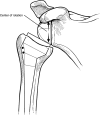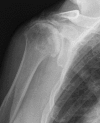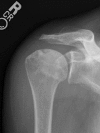Indications for reverse total shoulder arthroplasty in rotator cuff disease
- PMID: 20049573
- PMCID: PMC2865601
- DOI: 10.1007/s11999-009-1188-9
Indications for reverse total shoulder arthroplasty in rotator cuff disease
Abstract
Background: Reverse total shoulder arthroplasty (RTSA) was introduced to treat rotator cuff tear arthropathy but is now used to treat a variety of problems. Although its use has expanded substantially since the FDA's approval in 2004, the appropriateness in patients with rotator cuff disease is unclear.
Questions/purposes: We review the use of RTSA in patients with rotator cuff disease to (1) describe classification of rotator cuff tear reparability and the concept of a balanced shoulder; (2) explore the theory behind RTSA design relative to rotator cuff arthropathy; (3) discuss the indications and contraindications for RTSA; and (4) review published outcomes of RTSA for rotator cuff arthropathy.
Methods: We performed a selective review of the literature on the use of RTSA in the treatment of rotator cuff disease.
Results: Modern RTSA designs restore deltoid tension and a functional fulcrum to the rotator cuff deficient shoulder, which allows recovery of active shoulder elevation and effectively restores function in short- and medium-term followup studies.
Conclusions: In short-term followup the RTSA relieves symptoms and restores function for patients with cuff tear arthropathy and irreparable rotator cuff tears with pseudoparalysis (preserved deltoid contraction but loss of active elevation). Severely impaired deltoid function, an isolated supraspinatus tear, and the presence of full active shoulder elevation with a massive rotator cuff tear and arthritis are contraindications to RTSA.
Clinical relevance: For properly selected patients who have symptomatic and disabling rotator cuff deficiency, RTSA can result in life-changing improvements in pain, motion, function, and patient satisfaction.
Level of evidence: Level V therapeutic study. See Guidelines for Authors for a complete description of levels of evidence.
Figures






References
-
- Boileau P, Chuinard C, Roussanne Y, Neyton L, Trojani C. Modified latissimus dorsi and teres major transfer through a single delto–pectoral approach for external rotation deficit of the shoulder: as an isolated procedure or with a reverse arthroplasty. J Shoulder Elbow Surg. 2007;16:671–682. doi: 10.1016/j.jse.2007.02.127. - DOI - PubMed
Publication types
MeSH terms
LinkOut - more resources
Full Text Sources
Other Literature Sources
Medical
Research Materials

